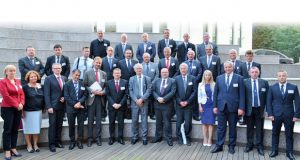Contrary to reports from other sources, the appraisal of RAG Aktiengesellschaft, Herne/Germany, of their mine water concepts has been confirmed by the current results of an expert survey commissioned by the State government of North Rhine-Westphalia, which was published in January. According to this survey, the PCB soil seepage is considerably reduced by the increase in mine water. Today, the introduction of mine water now safely complies with the environmental quality standard applicable to surface water. The survey also quite clearly confirms the opinion of RAG that the residual materials used for backfilling in underground locations do not pose a danger to humans or the environment.
PCB usually binds to particles. The fewer the particles that reach the surface as suspended particles in the mine water, the lower the PCB deposits in the surface water. Due to the planned increase in mine water, more suspended particles remain underground, and the minimum contamination of PCB is further considerably reduced.
A feasibility study was also commissioned by the State to analyse the technical possibilities for reducing further PCB fractions from the mine water. They cannot be filtered out completely. The proportion of PCB attributed to RAG as a percentage of the total PCB fraction, e. g., in the Rhine, is only 0.2 %. This poses the question of where the other 99.8 % comes from. A state-wide survey, e. g., in the form of a PCB cadastral survey, could be used to shed light on the matter.
The situation in the Saarland is similar. The proportion of PCB attributed to RAG as a percentage of the total PCB fraction in the river Saar, is only 1 %. This also highlights the question of where the other 99 % is coming from, and the state-wide PCB land register currently being compiled in the Saarland may provide some clarity. The implementation of the mine water concept for the Saar would also prevent the seepage of mine water into smaller stream courses such as the Klinkenbach or Köllerbach streams. This would negate the need for pumping stations, while reducing “sump drainage” and energy consumption. The release of CO2 and other emissions into the environment is therefore reduced. (RAG, Si.)
